THIS online calculator can determine when you are likely to get invited for your Covid vaccine.
The tool considers your age, your health, and whether you work in the NHS.
Click here to use the online Covid vaccine calculator
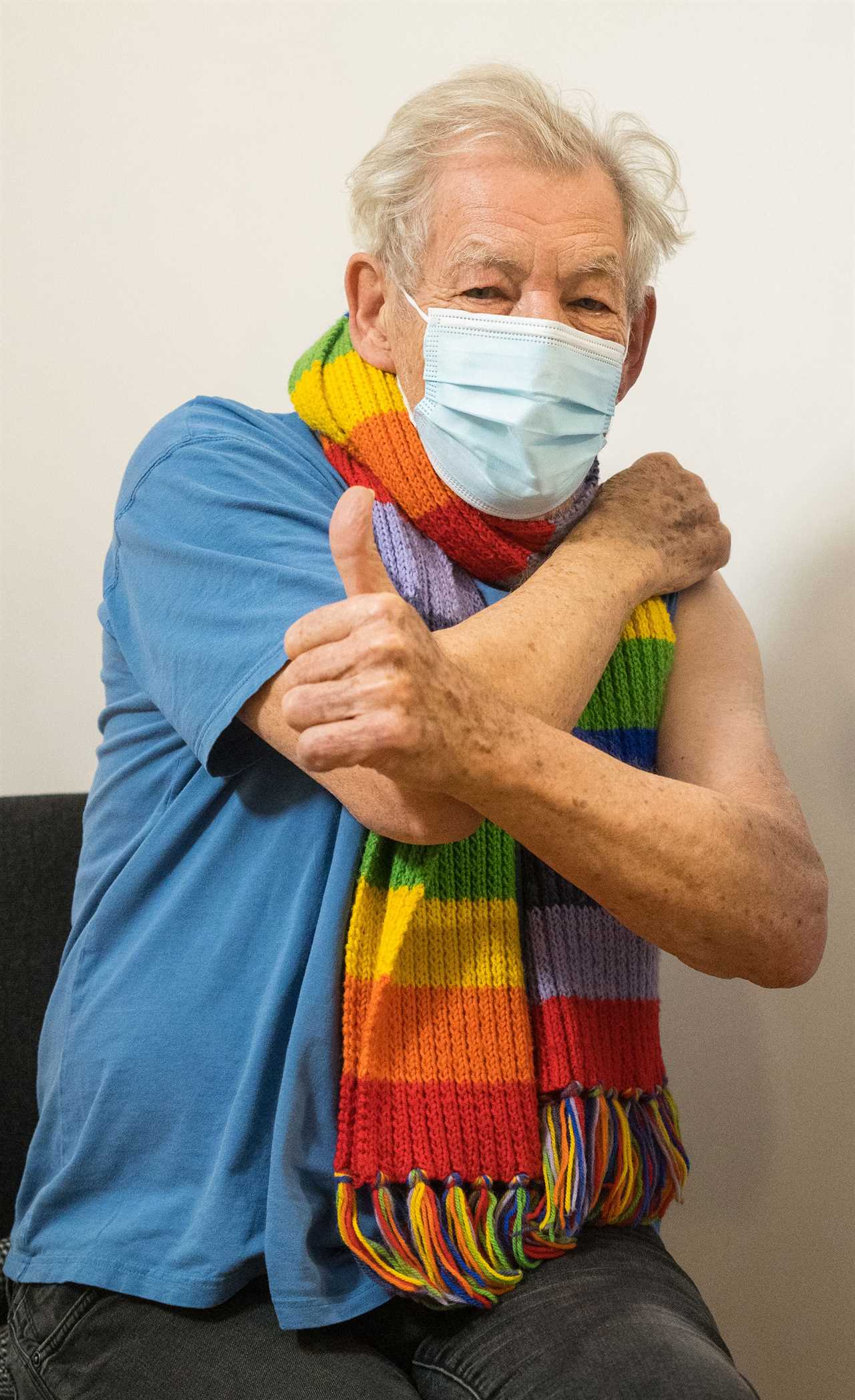
On the December 8, Margaret Keenan became the first person in the UK – and the world – to receive an approved Covid-19 jab.
It marked the beginning of the end of the pandemic – however, experts say it will take years for the whole population to get their jab.
Although the UK has paid for 340 million vaccine doses, so far only one of the seven candidates – the Pfizer/BioNTech jab – has been approved for use.
The Government has secured 40 million doses of the Pfizer jab – enough for 20 million people as a booster jab is required a few weeks after the first shot.
It had been hoped that 10 million doses would be in the country by the end of 2020, but this figure later dropped to five million.
The Oxford/AstraZeneca jab is expected to be approved imminently – possibly as soon as today or tomorrow – by the Medicines and Healthcare products Regulatory Agency, according to reports.
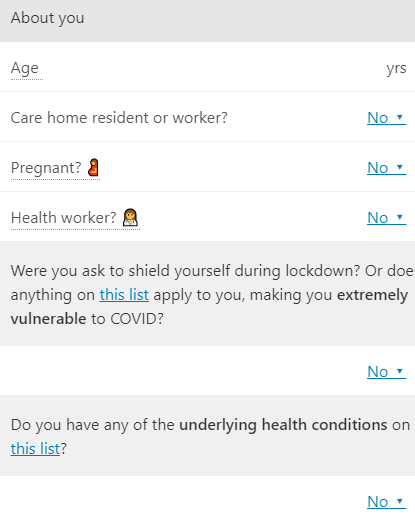
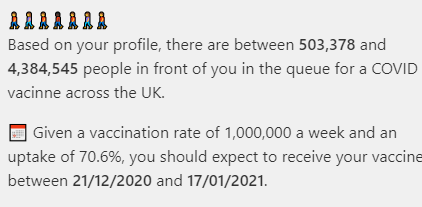
There is a vaccine prioritisation list so that the most vulnerable and the elderly, along with healthcare workers, can get the jab first – but that leaves millions still waiting for theirs.
If the Oxford vaccine is given the green light from regulators this would speed things up – the UK has secured 100 million doses, enough for 50 million people.
When will you get your vaccine?
Omni’s vaccine queue calculator will estimate for you how many people are ahead of you in the queue to get a Covid vaccine in the UK.
It also predicts how long you might have to wait to get your vaccine.
All you need to do is enter your age, job and if you have a health condition.
It’s based on the Government’s priority list and the likely rate of vaccination.
The tool assumes that one million people will be vaccinated in a week – the Government’s target.
The vaccine programme has set off at a slow start, but 25 million are set to have the jab by Easter – way more than one million a week.
Five million doses arriving before the end of the year, but it is unlikely these will actually be administered, with the programme kicking into action in the New Year.
Omni also predicts 70 per cent of people accept their jab offer, based on flu vaccine uptake, but in reality this could be lower.
A 45-year-old healthcare worker with a health condition would expect to get their vaccine between December 20 of this year and January 16 next year, the website says.
If vaccination continues at the rate it is at the moment – 69,000 a week – people will be waiting a lot longer.
It would take 15 years for the whole population to receive their vaccine doses.
At this rate, it means a 45-year-old healthcare worker with a health condition would not get their jab until around February of next year, the tool estimates.
But it could be as late as March 2022.
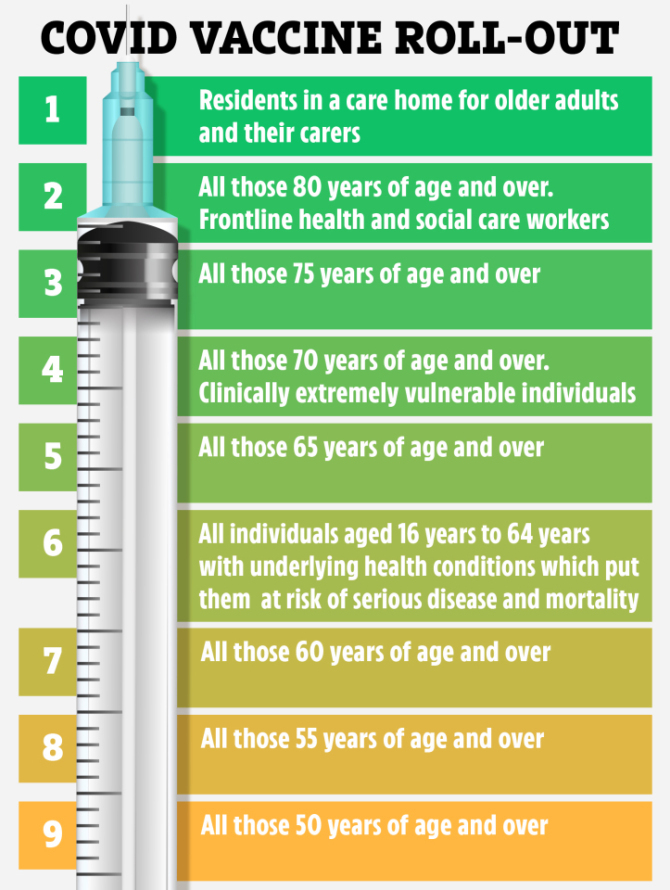
The calculator is only a model to give a broad idea of how long you may need to wait for your jab.
But the creators say they believe it is realistic that one million people will be vaccinated per week in the next year.
The Government have explained everyone must wait until they are contacted by the NHS, offering them an appointment.
A quarter won’t get their jab until 2022
It comes after research reveals almost a quarter of the world’s population will not have access to a Covid-19 vaccine until 2022.
Experts from the Johns Hopkins Bloomberg School of Public Health in Baltimore in the US said high-income countries have already secured billions of doses, with uncertainty around access for middle and low-income countries.
Writing in the British Medical Journal (BMJ), they noted that rich countries have reserved 51 per cent of available doses, though they comprise only 13.7 per cent of the world’s population.
Of the 13 manufacturers, only six, including AstraZeneca/Oxford University and Novavax, have sold to poorer countries.
The experts warned that, even if manufacturers meet all their production goals, people in poorer countries could face a long wait.
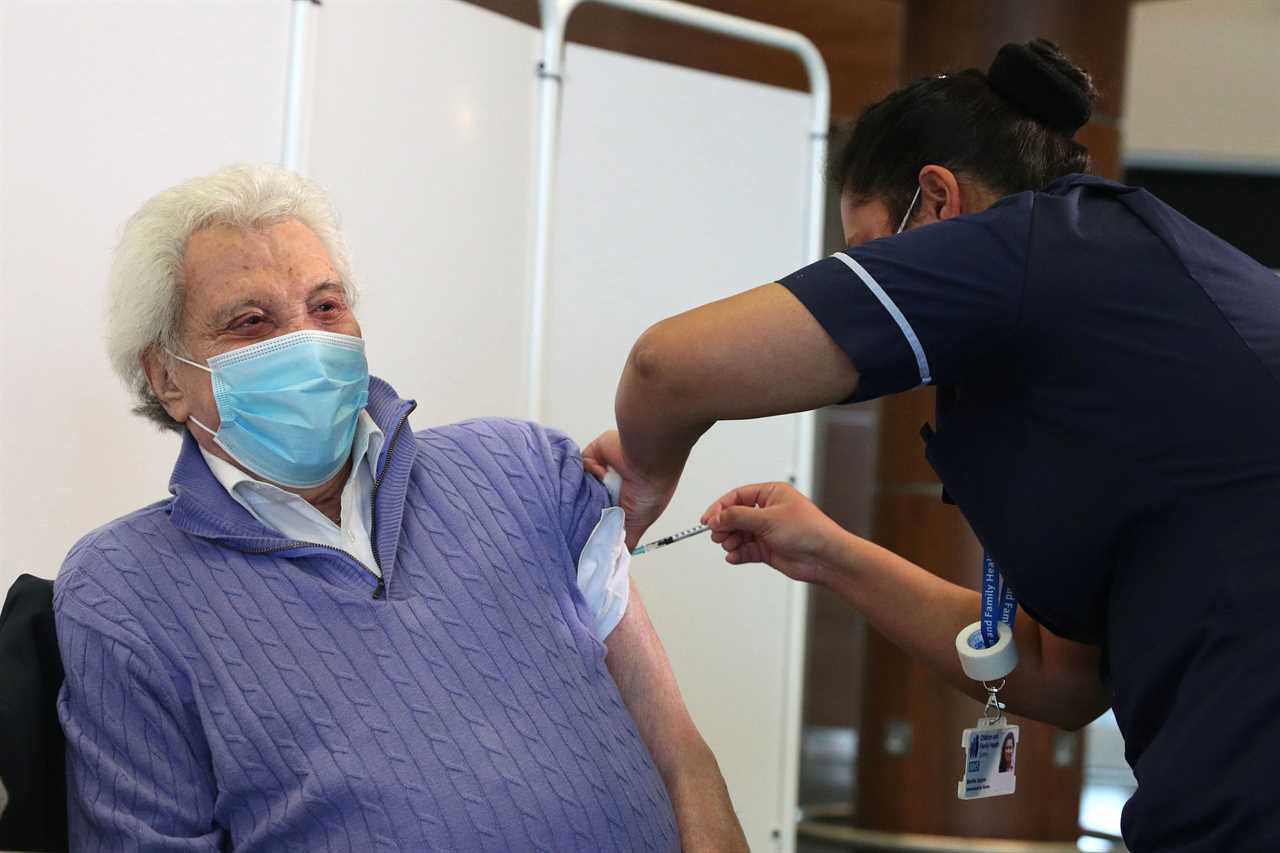
“Even if these leading manufacturers were all to succeed in reaching their projected maximum production capacity, nearly a quarter of the world’s population would not have access to a vaccine until at least 2022″, the researchers said.
The UK has joined the international Covax drive which aims to boost equitable access to Covid-19 tests, treatments and vaccines.
Scientists on the project have said on a number of occasions they expect the MHRA to come to a conclusion before the end of this year.
NHS boss Sir Simon Stevens believes 22million Brits will be vaccinated by late spring as the rollout continues at record pace.
It will be a huge relief for hospitals who are now caring for up to three-times as many Covid patients as they were at the peak of the first wave.
The vaccine developed by the University of Oxford and AstraZeneca is expected to be approved this week.
And it could be made available for use from Monday, with 10,000 medics and volunteers trained ready to assist.
Health chiefs want to jab 1million a week including at mass vaccination centres in stadiums, race courses and village halls.
It will ease pressure on the NHS, which has suffered its toughest ever year and is battling a bigger second wave of coronavirus.
Sir Simon praised the efforts of NHS staff during the pandemic, saying the nation owes them an “enormous debt of gratitude”.
He added: “Now again we are back in the eye of the storm with a second wave of coronavirus sweeping Europe and, indeed, this country.
“We think that by late Spring with vaccine supplies continuing to come on stream we will have been able to offer all vulnerable people across this country Covid vaccination.
“That perhaps provides the biggest chink of hope for the year ahead.”
The Oxford vaccine is more flexible than the Pfizer jab, in that it can be stored at fridge temperature, making it easier to transport and keep at deploy in places like mass vaccination centres.






